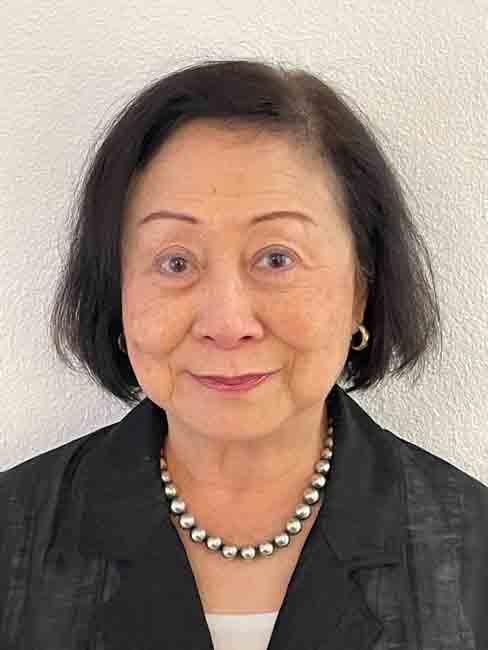Thursday, May 30, 2024
12:00 - 1:00 PM MST
This event will honor individuals/groups/teams/organizations who have exhibited clinical, research, educational, community engaged, and/or DEI related excellence in support of the Asian American, Native Hawai’ian, and Pacific Islander community at UNM Health Sciences.
Please nominate someone by Wednesday, May 22, 2024

Associate Professor
UNM College of Nursing
Jongwon Lee, PhD, RN, is an Associate Professor at The University of New Mexico College of Nursing. Dr. Lee attended the State University of New York at Buffalo, School of Nursing, where she earned her Doctor of Philosophy in Nursing and Master of Nursing Science degrees, focusing on maternal and women's health. She earned her RN-BSN degree from Yonsei University and her Diploma in Nursing from the National Medical Center College of Nursing in Seoul, South Korea. Dr. Lee’s research primarily addresses health disparities and the health of underrepresented minority populations, with a particular emphasis on Asian American and immigrant health. Her research also focuses on the development and psychometric evaluation of instruments and women’s health.

Distinguished Professor, Regents’ Professor & Miner’s Colfax Medical
Center Endowed Chair in Mining-Related Lung Diseases
Interim Director for Faculty Academic Affairs, UNM Health Sciences
Assistant Dean, Mentoring and Faculty Retention, UNM SOM Office for Faculty Affairs and Career Development
Akshay Sood is a tenured Distinguished Professor, Regents Professor, and the founding Miners’ Colfax Medical Center Endowed Chair at the University of New Mexico’s School of Medicine. Quadruple board-certified in Internal Medicine, Pulmonary Medicine, Critical Care Medicine, and Occupational and Environmental Medicine, he is recognized as a national expert in occupational lung disease. With HRSA funding, he has set up the only occupational lung disease rural-based program in New Mexico for coal miners, uranium miners, and nuclear weapons workers, mostly from Hispanic and Native American communities. He was funded by the NIH to study techniques to prevent the spread of COVID-19 infection in rural essential workplaces. He founded the Miners Wellness teleECHO Program for telementoring professionals involved in the care of miners. He received the 2020 UNM School of Medicine Community Engagement Award and the 2017 UNM HSC Faculty Research Excellence Award in Team Science. He serves as the co-chair of the Respiratory Health Cross-Sector Council in the National Occupational Research Agenda of the National Institute for Occupational Safety and Health. As the Assistant Dean of Mentoring and Faculty Retention at School of Medicine and Interim Director of Health Sciences Faculty Academic Affairs, he is a leader in mentoring and faculty retention interventions. He is the P.I. of a multi-institutional U01 grant on the “Effectiveness of Innovative Research Mentor Interventions among Underrepresented Minority Faculty in the Southwest (NIGMS U01GM132175-01).”

Professor of Pediatrics,
Interim Vice Chair of Research for Pediatrics
Division Chief of Adolescent Medicine
UNM School of Medicine, Department of Pediatrics
Dr. Alberta Kong is a professor of pediatrics, subspecialty boarded in adolescent medicine at the University of New Mexico School of Medicine, with a primary appointment in the Department of Pediatrics and a secondary appointment in the Department of Family and Community Medicine. She has dedicated over two decades to advancing child and adolescent healthcare. As the Interim Vice Chair of Research in Pediatrics, Chief of the Division of Adolescent Medicine, and Director of Envision New Mexico 2.0: The Initiative for Child Healthcare Quality, Dr. Kong has been instrumental in improving healthcare quality and outcomes for young people in our state.
Dr. Kong's educational background includes a Medical Degree from the University of Arizona and a Master of Public Health from the University of New Mexico. Her career is marked by significant contributions to research, with continuous NIH funding since joining the faculty in 2006, and earning numerous awards such as the UNM Health Sciences Center (HSC) Faculty Research Excellence Award in Population Science and recognition as a top doctor in Albuquerque.
Committed to mentorship, Dr. Kong has guided numerous faculty, pediatric residents, and medical students in their research and professional development. Their work has been widely published in esteemed journals, and they have presented at numerous national and international conferences. Dr. Kong's leadership extends to several professional organizations, where she has served in various capacities, including President of the Western Society for Pediatric Research, grant reviewer for NIH study sections, and currently protocol chair for a multicenter pediatric clinical trial in the NIH-supported IDeA States Pediatric Clinical Trials Network.
In support of the Asian American and Pacific Islander community, Dr. Kong co-chaired the inaugural AAPI Heritage Month at UNM HSC in 2021 after witnessing the growing incidence of anti-Asian violence that surged during the COVID-19 pandemic. She felt the need to bring awareness and discuss the ongoing challenges faced by the AAPI community. Dr. Kong continues to support AAPI students as an advisor for the Asian Pacific American Medical Student Association. She is dedicated to providing a safe space where AAPI students can connect with someone who understands their experiences.
As we celebrate Asian American and Pacific Islander Heritage Month, the UNM Health Sciences Office for Diversity, Equity & Inclusion is giving away 20 copies of the book "Minor Fellings: An Asian American Reckoning" by Cathy Park Hong. The books will be available to the first 20 people who express interest in receiving this book by using the link below.
The books will need to be picked up in person from the UNM Health Sciences Office for DEI, located in HSSB, Suite 102 on the dates below, during which time you can also informally connect and chat with Dr. Lindsay Smart, Associate Vice President for Leadership and Faculty Equity and Inclusion.
Wednesday, June 5, 2024 or Thursday, June 6, 2024
12:00 - 1:00 PM MST
Click here to download our Zoom background!
May 11, 2023
12:00 – 1:00 PM MST
Zoom
Sojeong Nam, Ph.D., LMHC, NCC

Sojeong Nam is an Assistant Professor of Counselor Education in the Department of Individual, Family, and Community Education at The University of New Mexico. She has received a Ph.D. in Counselor Education and Supervision from The University of Iowa, and her experience in the field of psychology and mental health counseling includes working with adolescents and young adults dealing with depression, anxiety, PTSD, ADHD, and suicidal ideation/behaviors across multiple settings. Her professional and scholarly pursuits are centered around comprehending and reducing mental health disparities. Currently, her research efforts concentrate on investigating and deconstructing implicit biases in counselors-in-training, addressing the issues of mental health literacy and stigma within underserved populations, and developing culturally responsive interventions for suicide survivors.
Jeongwoon Jeong, Ph.D., NCC

Jeongwoon Jeong has completed his Doctorate in Counselor Education and Supervision at The University of Iowa and currently serves as an Assistant Professor of Counselor Education in the Department of Individual, Family, and Community Education at The University of New Mexico. He has worked with adults with depression, anxiety, and personality disorders in diverse settings such as local mental health agencies, a rehabilitation center, and an alternative high school. Jeongwoon's research interests predominantly focus on the mental health and addiction concerns of marginalized populations, multicultural counseling competence, and multicultural counselor education.
Learning Objectives:
Tuesday, May 16, 2023
5:00 - 6:30 PM MST
Hybrid Format
Moderator(s):

Jay Zhu
Assistant Professor of General Surgery
UNM School of Medicine

Akshay Sood, MD
Tenured Professor of Internal Medicine
UNM School of Medicine
Assistant Dean of Mentoring and Faculty Retention MCMC Endowed Chair in Mining-Related Lung Diseases

Joyce Pang, MD
Resident Physician, Department of General Surgery
UNM School of Medicine
Learning Objectives:
Thursday, May 18, 2023
6:00 - 7:30 PM MST
Hybrid Format
The purpose of the event is to bring together community members to learn about notable Asian American/Pacific Islander identified individuals and their contributions to health care and society. The workshop will be fashion in a trivia-based approach to ensure on-going engagement and fun! Prizes will be distributed!
Learning Objectives:
Description: Professor Eguchi will talk about their book "Asians Loving Asians: Sticky Rice Homoeroticism and Queer Politics". Our AAPIRC student Crystelle Rodis (they,them) will be facilitate the discussion.
Moderator:

Flora Abudushalamu
MD/MPH Candidate | Class of 2024
University of New Mexico School of Medicine
Speaker:

Nadia Islam, PhD
Associate Professor, NYU Grossman School of Medicine; Associate Director, NYU Langone Institute for Excellence on Health Equity
Nadia Islam, PhD, is an Associate Professor in the Department of Population Health at the NYU Grossman School of Medicine and the Associate Director for NYU Langone’s Institute for Excellence in Health Equity. Her rigorous research program, marked by a collaborative approach involving multiple clinical and community stakeholders, focuses on developing culturally relevant community-clinical linkage models to promote health equity in disadvantaged communities. Dr. Islam co-directs the NYU-CUNY Prevention Research Center (PRC) and the Community Engagement and Population Health Research core of NYU’s Clinical Translational Science Institute. She is also a lead investigator in the NYU Center for the Study of Asian American Health, the nation’s only NIH-funded research center of excellence dedicated to eliminating disparities in Asian communities.
Dr. Islam is the principal investigator on several NIH- and CDC-funded initiatives evaluating the impact of community health worker (CHW) interventions on chronic disease management and prevention in diverse populations.
Dr. Islam is a medical sociologist with a doctorate in Sociomedical Sciences from Columbia University. Her work has been featured in the New England Journal of Medicine, JAMA, American Journal of Public Health, and numerous other peer-reviewed journals.
Session learning objectives:
Moderator:

Akshay Sood, MD
Tenured Professor & Miners' Colfax Medical Center Endowed Chair in Mining-Related Lung Diseases
Medical Director, Miners' Wellness Tele-ECHO Clinic
Assistant Dean, Mentoring and Faculty Retention, UNM School of Medicine Office of Faculty Affairs and Career Development
Division of Pulmonary, Critical Care and Sleep Medicine
Department of Internal Medicine
University of New Mexico School of Medicine
Speaker:

Archana Chatterjee, MD, PhD
Dean, Chicago Medical School, Vice President for Medical Affairs, Rosalind Franklin University of Medicine and Science
Dr. Archana Chatterjee joined Rosalind Franklin University in April 2020 and is Dean of the Chicago Medical School and Vice President for Medical Affairs. For the previous 7 years, she served as Professorand Chair of the Department of Pediatrics and Senior Associate Dean for Faculty Development at the University of South Dakota Sanford School of Medicine (USD SSOM), Sioux Falls, SD. She has spent nearly 12 years as a leader in Faculty Affairs/Faculty Development (FA/FD), initially at Creighton University School of Medicine, and later at USD SSOM.
Dr. Chatterjee has been elected/selected to serve on several national Advisory Boards and Committees including the US Food and Drug Administration’s Vaccines and Related Biological Products Advisory Committee, the Association of American Medical Colleges’ Group on Women in Medicine and Science, the Pediatric Infectious Diseases Society Board of Directors, and the American Board of Pediatrics Subboard of Pediatric Infectious Diseases.
Mentorship and sponsorship of faculty and learners has been a hallmark of Dr. Chatterjee’s entire thirty-year career in academic medicine. Through her tireless efforts at guiding, promoting and encouraging faculty and learners, she has impacted the careers of numerous leaders, faculty members, fellows, residents, and students, not only at her home institutions, but nationally and internationally. Another area of concentration for Dr. Chatterjee has been diversity, equity and inclusion (DEI), particularly gender diversity and intersectionality. She has focused some of her scholarly effort on collaborative projects related to faculty and leadership development as well as DEI initiatives, participating in presentations at national conferences and publishing her work in high-impact, peer-reviewed journals.
Trained as a pediatric infectious disease specialist, Dr. Chatterjee has practiced in her field for over 20 years, conducted over 120 clinical trials, published over 90 peer-reviewed articles, 26 invited review articles, 24 book chapters and one book. She serves as a reviewer for 35 journals. In the past 20 years, Dr. Chatterjee has delivered over 700 lectures and 200 scientific presentations at various international, national, regional, and local venues. She has served as the course director for over 30 CME programs, given over100 media interviews and published 30 newspaper articles.
Session learning objectives:
Your questions during the session have been answered.
Learning objectives:
Moderator:

Akshay Sood, MD
Tenured Professor & Miners' Colfax Medical Center Endowed Chair in Mining-Related Lung Diseases
Medical Director, Miners' Wellness Tele-ECHO Clinic
Assistant Dean, Mentoring and Faculty Retention, UNM School of Medicine Office of Faculty Affairs and Career Development
Division of Pulmonary, Critical Care and Sleep Medicine
Department of Internal Medicine
University of New Mexico School of Medicine Panelists:

Anisha Asundi, MPH
DEI Program Director, Project ECHO
Anisha Asundi (she/her/hers) is a racial and gender justice advocate and higher education professional who is passionate about advancing evidence-based diversity, equity, and inclusion work. She is currently the Diversity, Equity, and Inclusion Program Director at Project ECHO, under the University of New Mexico's Health Sciences Center. For 8 years, she worked as a research fellow at the Women and Public Policy Program (WAPPP) at Harvard’s Kennedy School of Government, where she specialized in research translation and program management. Her research and practial work lies in the foundations of health equity and social justice - particularly in increasing the wealth of research among marginalized groups such as women, people of color, LGBTQ communities and working class populations. Outside of the workplace, she is a passionate community organizer fighting the displacement of Asian American communities in the US, and previously served as a board member and member lead with the Asian American Resource Workshop in Boston, MA.

Judy Cannon, PhD
Associate Professor
Dr. Judy Cannon obtained her B.A. from the University of California at Berkeley in both Molecular Cell Biology and Political Science (1995), then an M.S. from San Francisco State University and Ph.D. in Immunology from the University of Chicago (2003). She completed her postdoctoral training also at the University of Chicago and joined the faculty at University of New Mexico School of Medicine in 2010. She is an Associate Professor in the Department of Molecular Genetics and Microbiology with a secondary appointment in Pathology. She is the Education Chief of the department as well as the director for the Core Facilities of the Autophagy, Inflammation, and Metabolism Center of Biomedical Research Excellence.
The Cannon laboratory studies immune responses focusing on how T cells function to clear infection including influenza infection in the lung. We focus on understanding T cell function, in particular, how T cell movements in tissues such as the lung and lymph nodes affect immune clearance of infection. Using a combination of cutting-edge in-vivo imaging techniques and computational modeling, we quantitatively define how T cells move in tissues such as lung. We have developed sophisticated quantitative analysis and modeling tools to quantitatively determine how T cells search for targets in tissues. We have identified microenvironmental influences that impact T cell motion. Using novel quantitative tools developed by our group, we show that T cells use structures and cells within the tissue microenvironment to more effectively search for pathogen and clear infection.

Pankaj Vohra, MBBS, MD
Assistant Professor
Division of Pediatric Gastroenterology, UNM since 2017.
Medical school and Pediatrics Residency- All India Institute of Medical Sciences, New Delhi, India
Fellowship - Mt Sinai Medical Center, New York

Jay Zhu, MD
Surgeon, Attending Physician
Assistant Professor
My family first immigrated to the United States in the 1980s, and I grew up on the gulf coast of Florida before moving out to sunny California during my later childhood. I’ve lived in many areas of the U.S. during my education and training, but I was drawn to New Mexico as a beautiful place to raise my family while serving a diverse community of patients. My position at the University of New Mexico allows me to combine my expertise in advanced minimally invasive surgery with my passion for surgical education, all while furthering our larger mission to promote diversity, equity, and inclusion.
Being an immigrant, father, and former competitive swimmer, I recognize that my primary job as a surgeon is to return patients back to their normal lives (and all the things that bring them joy) as quickly and seamlessly as possible. I absolutely love what I do, and I am thankful for all the people I get to work with here at UNM—especially all the patients who have entrusted me with their care, and who constantly inspire me with their resilience and grace.
Moderators:

Joyce Pang, MD
MD PGY-3
Learning Environment Education Fellow
UNM General Surgery

Sireesha Koppula, MD, MBA, MPH, CPE
Associate Professor, Department of Medicine
CMO Ambulatory
UNM Hospitals
Speaker:
Esther Churchwell
Board Member
New Mexico Japanese American Citizens League
Esther Churchwell, recounts Japanese Heritage, Culture & History in New Mexico and the United States.

Moderator:
Sangeetha Prabhakaran, MD FACS

Speakers:
City Councilor Len Sena, Aleli Colon, Kiran Katira
Join us for a conversation highlighting Asian/Pacific American leaders in the community. They will share their stories and discuss the importance of representation.

Moderator:
Angelina Rodriguez, RN, MSN Candidate

Speaker:
Grace Hsu, MLS
Grace S. Hsu was born in China. She has taught courses on Chinese culture, calligraphy, language and literature. She will be leading a discussion on Chinese language, poetry, mythological creatures, Tai Chi, cuisine, family and customs.
A Panel Discussion with HSC Faculty and Learners
May 21
12:00 - 1:00 PM MDT

Moderator:
Alberta Kong, MD, MPH
Professor and Chief
Division of Adolescent Medicine
Department of Pediatrics

Speakers:
Jongwon Lee, PhD, RN
Associate Professor
College of Nursing
Jim Ninomiya, MD, MS
Professor
Department of Orthopaedics & Rehabilitation
Dang Vu
MS3, UNM School of Medicine
Bring your lunch and listen to your colleagues reflect on their Asian identity to enhance your cultural humility. HSC community members will share their perspectives on their culture and lived experiences within the health science professions and the U.S.
Moderators:
Pamela Hsu, MD
Assistant Professor
Division of Cardiology
Department of Internal Medicine
Angelina Rodriguez, RN
MSN Candidate

Speaker:
Grace Hsu, MLS
Grace S. Hsu was born in China and will provide a brief discussion and history on the art of Chinese calligraphy. She has taught courses related to Chinese culture, calligraphy (a Gold prize winner in a calligraphy competition), language and literature. She will also demonstrate and actively engage participants in the art form of Chinese calligraphy. Recommended art supplies for the event include the following: white art paper or water color paper, paint brush and black water color paint; For those who are interested in the traditional supplies please consider the following: Chinese calligraphy brush, white rice paper and liquid black ink. The specialized supplies may be purchased at local art store. Remember your favorite glass of wine or beverage to enjoy during the session!
Moderator:
Nancy Pandhi, MD, MPH, PhD
Professor & Vice Chair of Research
Sireesha Koppula, MD, MBA, MPH, CPE
Associate Professor, Department of Medicine
CMO Ambulatory
UNM Hospitals
Speakers:

Pradeep V. Kadambi, MD, MBA, FASN, FAST
Professor, Department of Medicine
Senior Associate Dean for Clinical Affairs,
UF College of Medicine – Jacksonville
President and CEO University of Florida Jacksonville Physicians Inc.
David J. Park, DO, FAAFP, FACOFP
Professor of Family Medicine
Vice President & Dean of the Southern Utah Campus
Rocky Vista University , College of Osteopathic Medicine
A conversation about why many Asian Americans face difficulties in rising up into leadership positions in the United States. An opportunity to share personal stories about overcoming the challenges discrimination, micro-aggressions, and the model minority myth growing up and working in America. An opportunity for others to share, listen, learn, and grow.
A Panel Discussion with HSC Faculty and Learners

Moderator:
Alberta Kong, MD, MPH
Professor and Chief
Division of Adolescent Medicine
Department of Pediatrics

Speakers:
Betty Chang, MD
Professor and Executive Vice Chair for Internal Medicine,
Vice Chair for Inpatient Services and Clinical Operations
Department of Internal Medicine
Jim Feng PhD
Professor of Pharmaceutical Sciences
UNM College of Pharmacy
Joyce Pang, MD
MD PGY-3
Learning Environment Education Fellow
UNM General Surgery
Laura Parajon, MD, MPH,
Assistant Professor & Executive Director of Office for Community Health
Department of Family & Community Medicine
NM DOH Deputy Cabinet Secretary of Health
Bring your lunch and listen to your colleagues reflect on their Asian identity to enhance your cultural humility. HSC community members will share their perspectives on their culture and lived experiences within the health science professions and the U.S.

Moderator:
Joyce Pang, MD
PGY-3 Learning Environment Education Fellow
UNM General Surgery

Speaker:
Michelle Ko, MD, PhD
Assistant Professor
Department of Public Health Sciences
Division of Health Policy & Management
University of California, Davis
Dr. Ko's research examines the interconnections among policy, healthcare, and U.S. social structure. Her research spans topics from structural racism, health and aging, the healthcare safety net, Medicaid, long-term care, access to healthcare for minority populations, diversity in medical education, and the healthcare workforce.
In this session, Dr. Ko will present an overview of her work, "The Not Underrepresented Minorities: Asian Americans, Diversity and Admissions," published in Academic Medicine in 2020.
The session objectives are:
A Panel Discussion with HSC Faculty and Learners
May 28
12:00 - 1:00 PM MDT

Moderator:
Anjali Subbaswamy, MD
Division of Pediatric Critical Care
Department of Pediatrics

Speakers:
Nancy Pandhi, MD, MPH, PhD
Professor & Vice Chair of Research
Department of Family & Community Medicine
Pavan Muttil, PhD
Associate Professor
Department of Pharmaceutical Sciences
UNM College of Pharmacy
Fabiha Sabin
MS1, UNM School of Medicine
Bring your lunch and listen to your colleagues reflect on their Asian identity to enhance your cultural humility. HSC community members will share their perspectives on their culture and lived experiences within the health science professions and the U.S.